Epidemiology for Epidemiologists

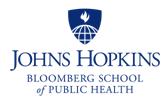
A monthly update covering people, events, research, and key developments
Editor’s Note:
It's summer and time to relax with some of your "must-read" books. We've included six book reviews that we've enjoyed recently. (If you've got books that interest your peers, please contact us at info@epimonitor.net so we can let you know what information we will need.)
This month we also feature an interview with Dr. Maya Mathur following her fantastic presentations at the SER conference. We also dug into the archives for an article about the process from scientific evidence to public policy written in 2015. It is an interesting read considering the current political divide worldwide.
We continue to provide you with Notes on People, an overview of what we read from the public media, and upcoming epidemiology events. Finally, don't miss the Job Bank offerings this month. We have some fantastic opportunities advertised both here and on our website.

Did you miss last month’s issue? Read it here: https://bit.ly/3O2Uyue or here: https://bit.ly/3Q4LUOz
In This Issue
-2- EpiMonitor Summer Book Round-Up

-5- Q&A with Dr. Maya Mathur
-8- From the Archives The Path from Evidence to Policy
-10- What We’re Reading
-12- Notes on People
-15- Near Term Epi Event Calendar
-17- Marketplace – Jobs & Events
June 2023 • Volume Forty Four • Number Six
EpiMonitor Summer Book Round-Up
Author: Madeline Roberts, PhD, MPH, and Katelyn Jetelina, PhD, MPH
Summer is in full swing, and whether you find yourself on a plane, at the beach, poolside, or otherwise, you may want an excellent read to take along on whatever adventures and endeavors you have in store. We’ve rounded up a few old and new books that we’ve been thinking about, and we hope they spark your interest and thinking!
Thinking, Fast and Slow
by Daniel Kahneman
https://bit.ly/3DpPmvq
Available in Kindle, Audio, Paperback & Hardcover formats
This book, written by Nobel Prize-winning economist Daniel Kahneman, is not about epidemiology per se but deals extensively with bias, heuristics, and systematic error in cognition. Startlingly insightful, Kahneman’s work on how we tend to make decisions and how to make better ones is a must-read. This book was required reading for a class during my (Madeline) MPH, and one that I have returned to on several occasions in the time since to reflect on my decision-making processes.
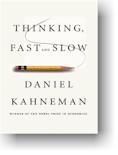 Mark White
Mark White

https://amzn.to/43zmeNd
Available in Kindle & Paperback formats
Written by epidemiologist and former CDC Director of International Health, Dr. Mark White, this book follows the harrowing, real-life experiences that comprised Dr. White’s career as an infectious disease specialist. The reflections on pandemics and life experiences from a true expert in disease investigation include his Ebola and HIV surveillance work in the Philippines and Uganda, where he encountered numerous natural disasters and political instability.
- Books cont'd on page 3
-2-
Adventures of a Disease Detective by
Lessons from the Covid War: An
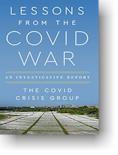
Investigative Report
by The Covid Crisis Group
https://amzn.to/44S5eCY
Available in Kindle, Audio & Paperback formats
Now that the COVID-19 emergency is over, we need a national commission to review what the United States got right, what we got wrong, and how we can prepare for the future, just like the 9/11 Commission. Unfortunately, it doesn’t look like this will happen due to the politicized landscape. This book is the next best thing. The commissioner for 9/11 conducted hundreds of interviews to understand lessons learned from experts around the country. Each chapter dives deep and accurately depicts the downfalls and successes. A fantastic read that every American should read, particularly those of us in public health.
Pathogenesis: A History of the World in Eight Plagues
 by Jonathan Kennedy
by Jonathan Kennedy
https://amzn.to/3K4Bw5G
Available in Kindle, Audio & Hardcover formats
A thorough delve into history and evolution through the lens of disease, Pathogenesis (written by a sociologist in 2023) is an engaging read on how outbreaks have shaped human events. From military conquests to labor practices, Kennedy makes a case for how infectious disease has often functioned as a “devastating weapon of mass destruction,” which has substantially contributed to and interfered in human history. After reading through thousands of years of the ravages of infectious disease, Kennedy’s call for collective political will to organize against the next pandemic should certainly register with readers.
- Books cont'd from page 2 -3- Books cont'd on page 4 Please DM us on Twitter @theEpimonitor or Instagram @epimonitor and let us know what you’re reading this summer!
Plagues and Peoples
by William H. McNeill
https://amzn.to/3Q6UCf9
Available in Kindle, Paperback & Hardcover formats
For a several-decades-earlier historical take on world history in disease, Plagues and Peoples (written by a historian in 1976) offers a comprehensive look at the implications of disease throughout human history and covers everything from ecology disruption and politics to migration and societal development. Science has advanced since 1976. However, this book came to mind not only because of the recent release of Pathogenesis but also because of the underlying premise: “…in any effort to understand what lies ahead, the role of infectious disease cannot properly be left out of consideration."
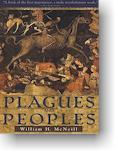
Creating Great Choices: A Leader's Guide to Integrative Thinking
 by Jennifer Riel, Roger L. Martin
by Jennifer Riel, Roger L. Martin
https://amzn.to/43znM9Z
Available in Kindle, Audio & Hardcover formats
Given the substantial upheaval over the past few years in virtually every sector, particularly the current state of public health, this book came to mind for rebuilding and creating a path forward. This book offers a framework for choices with several practical exercises, not just for leaders in the title but for anyone thinking critically about their organization or career. Perhaps the most valuable element of this book is that it presents an alternative to all-ornothing thinking, namely, taking the best aspects from opposing options and creating a new choice—and that this is a skill you can practice and cultivate. We can’t think of a more needed skill in the current age.
- Books cont'd from page 3
-4Please DM us on Twitter @theEpimonitor or Instagram @epimonitor and let us know what you’re reading this summer!
Author: Madeline Roberts, PhD, MPH
This month we were delighted to catch up with Dr. Maya Mathur who gave several fantastic presentations covering causal inference and Evalues at the recent SER conference. Dr. Mathur is an Assistant Professor in Stanford University’s Quantitative Sciences Unit and the Department of Pediatrics. She also serves as the Associate Director of Stanford Data Science’s Center for Open and Reproducible Science (CORES). We enjoyed following up with Dr. Mathur about everything from open science and p-hacking to advice for early career epidemiologists and data scientists.

EpiMonitor: Could you share a bit about your current research interests? Are there any projects about which you are particularly excited?
MM: For better or worse, I'm a greedy algorithm: I tend to jump into whatever research topic happens to most excite me at any given moment, so I do tend to jump around. On the epi side, I've been very interested recently in selection bias and missing data, and how graphical models can help straighten out these counterintuitive issues. I'm enjoying delving into some new-to-me theory and proof techniques based on graphical models; it's all very confusing and interesting, an addictive combination. I also have a longerstanding interest in evidence synthesis and meta-analysis. Recently I've been very interested in meta-analytic methods to address p-hacking, which, it turns out, is a lot more pernicious than what we usually conceptualize as publication bias.
EpiMonitor: A PubMed search shows a substantial increase in the number of publications mentioning
E-values over the past ten years. Can you talk about the utility of E-values in causal inference and why you think there may have been such a rise in their use?
[Editor’s note: an E-value can be defined as “the minimum strength of association on the risk ratio scale that an unmeasured confounder would need to have with both the exposure and the outcome, conditional on the measured covariates, to fully explain away a specific exposure-outcome association.” (https://www.evalue-calculator.com/)
MM: I think their utility is as an easy-to-apply sensitivity analysis that is conservative in the sense that it allows for worst-case confounding. E-values certainly have their limitations as well, particularly in relation to their conservatism, though I think Peng Ding
- Mathur cont'd on page 6
Q&A
with Dr. Maya Mathur
-5-
Dr. Maya Mathur
and Tyler [VanderWeele, both co-authors on the Website and R package for computing E-values] have been thoughtful about trying to convey this in their various papers. In terms of uptake, I think it helps that some top journals are encouraging or requiring their use, and there is software to easily calculate E-values, so it is not a big lift. It's also pretty interesting that approaches very similar to the E-value can be used for many other forms of bias that manifest as some kind of backdoor path in a graph; the theory Peng developed for the E-value is general and flexible in this way.
EpiMonitor: Some of your work focuses on metaanalyses, which are useful in identifying patterns across the literature, but their utility can be restricted by publication bias. Can you talk about your work on P-hacking and the corresponding R package phacking, and how it addresses some of the issues arising from publication bias?
MM: What's fascinating about p-hacking is that we often talk about it alongside publication bias as if they're interchangeable, but they really are not. As traditionally conceived, publication bias is when there is a filter on which studies are published and available for inclusion in metaanalysis. But p-hacking is when investigators actually manipulate results within their studies, for example to obtain a significant result. The bias that arises from p-hacking is, it turns out, much harder to deal with statistically than the bias that arises from pure publication bias. The paper you're referring to provides some new meta-analytic methods that will be unbiased under many but not all forms of p-hacking and publication bias, unlike methods that only address publication bias. The R package and accompanying website (metabias.io) are largely thanks to my postdoc Mika Braginsky and I think goes a long way toward making the methods accessible.
EpiMonitor: Your personal website is a wealth of information with links to datasets, code, and lecture slide decks. You are clearly a proponent of open science! Can you talk a bit about what open science means to you and why it's important? Have you encountered any drawbacks?
MM: Yes, I believe that in general open science can lead to a much more reliable, efficient, and accurate scientific ecosystem. Some of the key tenets that I most strive for in my own work are making analysis code publicly available, making de-identified data available when permissible, and preregistering study hypotheses and protocols. There is increasingly compelling empirical evidence from other disciplines, especially the social sciences, that these kinds of practices can reduce errors and publication bias in the literature, and I hope to see our field update its norms and incentives accordingly. There can definitely be drawbacks to adopting open-science practices: for example, it's harder to p-hack and get attractive results to publish! On the other hand, I do find that pre-specifying analyses sharpens my scientific reasoning and that organizing data and code for public release encourages better, more reuseable workflows. Sometimes there are surprises as well. In a paper Matt Fox and I wrote, we recount a story where the public repo containing study materials for one of my papers became to my great surprise pretty popular for re-use in other papers. This not only meant people were citing the original paper a lot more than I'd expected, but also it was very fun to see the creative new ideas and results that others generated from the study materials.
EpiMonitor: You completed your PhD in 2018, do you have any advice for early career epidemiologists and data scientists?
- Mathur cont'd on page 7
-Mathur cont'd from page 5
-6-
-Harris County cont'd from page 6
MM: Yes, that's right, so probably my advice should be treated as untested and unreliable until further study! More seriously, for me an important guiding principle has been to keep at the forefront why I love being in academia in the first place, and relatedly, what I need in order to do work that contributes usefully to our canon of knowledge. Then I try to prioritize the most mission-critical things. I love going off into a hermit cave and struggling with a difficult concept or proof. This is the main reason I am in academia. It would be easy to let meetings and email constantly interrupt this kind of deep work time, but I try hard to prevent this from happening too often. Similarly, curiosity is vital to life in academia but can easily get pushed aside if we focus just on getting papers
out and checking off tenure criteria. If I get interested in something, I try to just roll with it even if it means writing a paper, or recently founding a lab, on a topic that is pretty out of the box. Last, of course, it's also helpful to try to have a life outside of work. I work strange hours, but do preserve a significant amount of time to enjoy friendships and several hobbies, and I think this makes the rigors of academia sustainable in the long run.
Dr. Mathur’s work, including links to publications, data repositories, and slide decks, can be found on her personal website: https://www.mayamathur.com/. ■
Interested in writing? The EpiMonitor is always looking for great articles to share with our readers Inquire with details madeline@epimonitor.net
-7-
The Path from Evidence to Policy –The Perspective of an Experienced Legislator
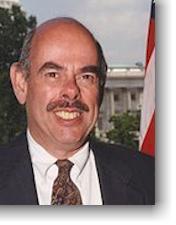 Author: Roger Bernier, MPH, PhD
Author: Roger Bernier, MPH, PhD
[Editor’s Note: In an increasingly divided world we thought it appropriate to look back to 2015 when one former congressman reflected on what it took at that time to move from scientific evidence to government policies.]
Researchers at Johns Hopkins have had a longstanding interest in how to translate research into policy or practice. This was evidenced over 15 years ago by a workshop on the topic reported in this newsletter (EM August/September 1998, see https://tinyurl.com/pr8jxgq ) and in the American Journal of Epidemiology. In keeping with that interest, the fall issue of Johns Hopkins Public Health magazine includes an interview with former Congressman Henry Waxman who was instrumental in passing legislation which reduced smoking, expanded Medicaid coverage, and increased access to generic drugs.
Below are excerpts from the interview conducted by Clarence Lam, MD, MPH, and himself recently elected as a Maryland state delegate.
CL: Is the politicization of science whether that’s climate change, environmental issues or vaccination policy a growing trend?
HW: Until five to 10 years ago, most people would pay a lot of deference to scientists because their decisions are based on evidence. Now I see a lot of people in power dismiss
science as just another point of view, and probably one that’s biased.
Ideology seems to be much more prevalent in approaching a number of issues that otherwise should be looked at as scientific issues.
CL: What motivates politicians and special interest groups to discredit scientists today?
HW: There are a lot of groups that oppose what the scientists think we ought to do, for
- Policy cont'd on page 9
-8-
November 2015
The Epi Wayback Machine - Articles From Our Archives
The Hon. Henry A. Waxman U.S. House of Representatives 1975-2015
ideological reasons—but more often than not, it’s for profits.
CL: What’s your advice to scientists, researchers and others reaching out to legislators to effect policy change?
HW: I think it’s important that people who have expertise and knowledge share that with the policymakers. They ought not to feel any reluctance in that kind of a role. They’re the ones who have a special knowledge and whose views carry a lot of weight. So my recommendation is that they try to get those views across.
Because of the nature of what they do, scientists and researchers often don’t want to say things in a conclusive kind of way—because their scientific method is to always keep looking to revise the hypothesis based on new evidence. And so they say, “It appears to be,” or “The overwhelming evidence would indicate…”
They need to be honest about how they express it, but not in any way be cowed by the difficulties.
CL: When you first arrived on Capitol Hill, I think there was a greater sense of collegiality and working amongst colleagues, particularly those across the aisle. Do you believe that today’s bickering and grandstanding is the new norm? Or is there hope that the pendulum will once again swing back to that spirit of bipartisanship?
HW: I think the idea of the spirit of bipartisanship is overrated, because we [always] had people who were partisans. But the parties had a more diversity of opinion than each party now has. …But we’ve seen a transition to the two political parties going to
polar points on a lot of issues.CL: So you attribute a lot of what we’re seeing today to further entrenchment within the parties themselves. And that’s led to fewer areas where they could work across the aisle?
HW: The idea of working across the aisle is still there. It’s a question of being patient enough. I look at my career in Congress as a good example. I authored many bills that became law that people now would say, “Well, of course we should be able to get nutritional information when we buy a food item.” Or, “Of course we shouldn’t have to breathe in someone else’s tobacco smoke in a public place.” Or, “It’s obvious that we ought to do everything we can to clean up the air we breathe.”
But there’s no inevitability to anything. Even the simple labeling law took years to pass, to develop the consensus behind it. The Clean Air Act took us 10 years of battling. On a lot of the laws, it sometimes took a decade or more to pass them as we tried to educate people, so that when they heard a quick sound bite from somebody on the other side who usually had an economic interest in the outcome to step away and evaluate the evidence and to see what’s really at stake. And eventually, people did come around.
To read the full Johns Hopkins interview, visit:
https://tinyurl.com/ozsjhon ■
-Politics cont'd from page 8
-9-
Editor's Note: All of us are confronted with more material than we can possibly hope to digest each month. However, that doesn't mean that we should miss some of the articles that appear in the public media on topics of interest to the epi community. The EpiMonitor curates a monthly list of some of the best articles we've encountered in the past month. See something you think others would like to read? Please send us a link at info@epimonitor.net and we'll include it in the next month
Public Health Topics
♦ Florida reports 7th case of locally acquired Malaria (Fox News)
https://fxn.ws/44STU9r
♦ Ongoing avian influenza outbreaks in animals pose risks to humans (WHO)
https://bit.ly/3q2WXNv
♦ World War III will be fought with viruses (WSJ via AppleNews+)
https://on.wsj.com/3NYYrQT
♦ WHO reports dozens of babies sickened by deadly viral infections (NBC News)
https://bit.ly/3O0zrZp
♦ The WHO declares aspartame “possibly” causes cancer. (NY Times)
https://nyti.ms/3DkcYSh
♦ How to lose a century of [public health] progress (The Atlantic via AppleNews+)
https://bit.ly/3K4AuXs
♦ Causaly raises $60M to give scientists access to “all of biology” (Sifted via AppleNews+)
https://bit.ly/3Q2DFlW
♦ Study demonstrates cellular immunity of “comb-structured mRNA” as a novel mRNA cancer vaccine (MedicalXpress via AppleNews+)
https://bit.ly/3YdXQQh
♦ Deadly Typhus spread by bug bites now found in US (NY Post)
https://bit.ly/3pXsSPx
- Reading cont'd on page 13
-10What We're Reading This Month
What We're Reading This Month - con't from
[Type a quote from the document or the summary of an interesting point. You can position the text box anywhere in the document. Use the Text Box Tools tab to change the formatting of the pull quote text box.]
page 12
♦ A new study shows your brain is shrinking for the wrong reason (Popular Mechanics via AppleNews+)
https://bit.ly/46XKVFK
♦ Antibiotic shortage could worsen Syphilis epidemic (NY Times)
https://bit.ly/3Oke1rJ
COVID-19
♦ Genetic variant may be why some people test positive for COVID-19 with no symptoms (Washington Post)
https://wapo.st/3Q1Znqf
♦ America’s best Covid dodgers revealed – 60M of us haven’t caught it (DailyMail)
https://bit.ly/44wDnIq
♦ Study finds children born during the pandemic have poorer communications skills (The Guardian)
https://bit.ly/44txdZI
♦ Harvard and Yale scientists study new condition dubbed “Long Vax” (DailyMail)
https://bit.ly/3q31way
♦ There’s now a rapid, accurate COVID-19 air detector (Time Magazine)
https://bit.ly/43xXXqN
-11-
Join us on our Facebook page at: https://bit.ly/2U29gUA or on Twitter at: @theEpimonitor or on Instagram at: @epimonitor
o you have news about yourself, a colleague, or a student?
Please help The Epidemiology Monitor keep the community informed by sending relevant news to us at this address for inclusion in our next issue. people@epimonitor.net
Honored: Amanda Crowson, MPH, RN, CPU, CIC was honored by APIC with the esteemed New InvestigatorAware at the 2023 Association for Professionals in Infection Control and Epidemiology (APIC) Conference and Exhibition. Crowson started her professional journey at AdventHealth Tampa in Florida, where she completed her field experience while a Master of Public Health student at the University of South Florida. She has dedicated herself to the field of infection prevention and even returned to school to become a registered nurse during the COVID-19 pandemic.

Honored: Henning Tiemeier, MD, PhD has been named one of the two recipients of the2023 Alzheimer Award by the Journal of Alzheimer’s Disease. Dr. Tiemeier received his Doctorate in Medicine and his sociology degree from the University of Bonn, Germany, and his PhD in Epidemiology from the Erasmus University in Rotterdam, the Netherlands. He is Professor of Psychiatric Epidemiology at the Erasmus University Medical Center Rotterdam and in 2018, was appointed Professor of Social and Behavioral Science and Sumner and Esther Feldberg Chair in Maternal and Child Health at the Harvard TH Chan School of Public Health.

Honored: Roseanne Freak-Poli, PhD has been named one of the two recipients of the2023 Alzheimer Award by the Journal of Alzheimer’s Disease. She is a life-course epidemiologist. Her work is strongly driven by social justice, being the distribution of wealth, opportunities, and privileges within a society. She is a Senior Research Fellow at the School of Clinical Sciences at Monash Health, Melbourne, Australia. She has been awarded an NHMRC Early Career Research Fellowship and a National Heart Foundation of Australia Postdoctoral Fellowship.

Appointed: The Philadelphia Department of Public Health announces the appointment of Dr. Landrus Burress as their new Director of the Division of Disease Control. Dr. Burress is an Air Force veteran and served as Chief of Public Health Operations for the Preventive Aerospace Medicine Division, US Air Force Central Command, 332nd Expeditionary Medical Group in Southwest Asia. In that role, he directed public health operations which included disease reporting and surveillance, communicable diseases, population health, occupational health, and public health emergency preparedness to maintain health for three global Southwest Asian locations.

D
People -12-
Notes on
Do you have news about yourself, a colleague, or a student?
Please help The Epidemiology Monitor keep the community informed by sending relevant news to us at this address for inclusion in our next issue. people@epimonitor.net
Appointed: Professor Marian Knight, who is Professor of Maternal and Child Population Health and Director of the National Perinatal Epidemiology Unit at Oxford Population Health, has been appointed National Institute for Health and Care Research (NIHR) Scientific Director for Research Infrastructure. She will lead on the strategic development of the NIHR’s infrastructure, working in partnership with infrastructure leaders. As part of her role on the NIHR Board, Professor Knight will support the Department of Health and Social Care Chief Scientific Advisor and NIHR Chief Executive, and the Director of Science Research and Evidence to deliver against the NIHR’s mission to improve the health and wealth of the national through research.

Honored: Dr. Joseph Pater has been recognized for a lifetime of work in cancer research with his appointment as an Officer of the Order of Canada. The honor acknowledges the impact of his dedication to clinical research which has improved the lives of Canadians with cancer. He is a Professor Emeritus at Queen’s, was the head of the Department of Community Health and Epidemiology, where he taught clinical trials courses and supervised graduate students and fellows. For over 40 years, he has advanced clinical trial research in Canada. “Dr. Pater is one of the most important individuals in Canadian cancer research, having built a network that has defined new standards of practice, improved patient outcomes, and is recognized globally as a centre for excellence," says Dr. Janet Dancey, Director of the Canadian Cancer Trials Group (CCTG). He is sometimes called the “father” of cancer clinical trials research in Canada.
Named: The University of Chicago has announced that Dan Nicolae has been named the Elaine M. and Samuel D. Kersten, Jr. Distinguished Service Professor in the Departments of Statistics and Medicine and the College. Nicolae joined the faculty at the University of Chicago in 1999. He has served as chair of the Department of Statistics from 2016-2022, section chief for the Section of Genetic Medicine from 2015-2016, and currently as faculty co-director of the Data Science Institute. Nicolae’s research seeks to understand the role of genetic, genomic and environmental factors, and their interactions, in the development of common diseases. A statistical geneticist and a mathematical statistician, he specializes in developing methodological advances for large data problems in biology and medicine.


Notes on People con't from page 12
Do you have news about yourself, a colleague, or a student?
Please help The Epidemiology Monitor keep the community informed by sending relevant news to us at this address for inclusion in our next issue. people@epimonitor.net
Jodie Guest, PhD, professor and senior vice chair of the Department of Epidemiology was awarded the 2023 Kenneth Rothman Career Accomplishment Award, which honors an outstanding scholar who has made extraordinary contributions to the field of epidemiology or whose work has had a profound impact on epidemiology.
Lauren Christiansen-Lindquist,PhD, assistant professor and director of graduate studies for MPH and MSPH programs in the Department of Epidemiology was awarded the 2023 Tom Koepsell & Noel Weiss Excellence in Education Award, which is awarded to an individual who has made substantial contributions to the field of epidemiology through mentoring, training and/or teaching.
Neel Gandhi, MD, and Sarita Shah, MD, professors in the Department of Epidemiology at Rollins with secondary appointments in Emory’s School of Medicine . Gandhi and Shah were awarded the 2023 Roger Detels Distinguished Researcher in Infectious Disease Award, which recognizes extraordinary contributions to the research field of infectious disease epidemiology.
Shakira Suglia, ScD, professor and vice chair in the Department of Epidemiology was awarded the 2023 Carol J. Rowland Hogue Award for Outstanding Mid-Career Achievement, which is given to a midcareer scientist who has made an exceptional contribution to the practice of epidemiology.

Notes on People con't from page 13
(From left) Drs. Lauren Christiansen-Lindquist, Sarita Shah, Jodie Guest, Neel Gandhi and Shakira Suglia from the Department of Epidemiology at Emory University's Rollins School of Public Health
Near Term Epidemiology Event Calendar
Every December The Epidemiology Monitor dedicates that issue to a calendar of events for the upcoming year. However that often means we don't have full information for events later in the upcoming year. Thus an online copy exists on our website that is updated regularly.
To view the full year please go to: http://www.epimonitor.net/Events The events that we are aware of for the next month follow below
August 2023
August 3-4
https://bit.ly/34bPNIB
Conference: 7th International Conference on Public Health (ICOPH 2023) / Multiple / Kuala Lumpur, Malaysia & virtual
August 5-10
https://bit.ly/3HF6IYM
Conference: JSM 2023 (Joint Statistics Meeting) / American Statistical Association / Toronto, Canada
August 8-26
https://bit.ly/38pSFlY
Summer Program: Erasmus MC Summer Program / Erasmus MC / Rotterdam, The Netherlands
August 8-12
https://bit.ly/3pVSNDh
Short Course: Principles of Research in Medicine and Epidemiology / Erasmus MC / Rotterdam, The Netherlands
August 8-12
https://bit.ly/3pYjt6k
Short Course: Principles of Genetic Epidemiology / Erasmus MC / Rotterdam, The Netherlands
August 8-12
https://bit.ly/3pWfN4V
Short Course: Advances in Clinical Epidemiology / Erasmus MC / Rotterdam, The Netherlands
August 8-12
https://bit.ly/327ATVW
Short Course: History of Epidemiologic Ideas / Erasmus MC / Rotterdam, The Netherlands
August 15-19
https://bit.ly/3ILLQx4
Short Course: Causal Inference / Erasmus MC / Rotterdam, The Netherlands
August 22-26
https://bit.ly/3pV8Ml0
Short Course: Social Epidemiology / Erasmus MC / Rotterdam, The Netherlands
August 22-26
https://bit.ly/3pUSXus
Short Course: Practice of Epidemiologic Analysis / Erasmus MC / Rotterdam, The Netherlands
August 22-26
https://bit.ly/3E1IH8Y
Short Course: Data Science in Epidemiology / Erasmus MC / Rotterdam, The Netherlands
August 23-27
https://bit.ly/3mXQ4qe
Conference: ISPE Annual Conference / International Society for Pharmacoepidemiology / Halifax, Nova Scotia, Canada
September 2023
Sept 12-13
https://bit.ly/3C0IFjk
Conference: Swiss Public Health Conference 2023 / University of Bern / Bern, Switzerland
-15-
Sept 12-15
https://bit.ly/3PBGvME
Conference: 11th Southeast Asia and Western Pacific Bi-regional TEPHINET Scientific Conference / SAFETYNET & Australia National University / Canberra, Australia
Sept 17-20
https://bit.ly/3PANSnA
Conference: 35th Annual Conference of the Intl Society of Environmental Epidemiology / ISEE / Kaohsiung, Taiwan
Sept 20-22
http://bit.ly/35hZRhG
Conference: 2023 CityMatch Leadership & MCH Epi Conference / CityMatch / New Orleans, LA
Sept 24-27
https://bit.ly/3huUxTC
Conference: 17th Vaccine Congress / Elsevier / Glasgow, Scotland
Sept TBA
https://bit.ly/3BMHkMR
Conference : American College of Epidemiology Annual Conference / ACE / Charlotte, NC
Please participate in our job seekers survey
This month we want to hear from you. What are you looking for in your next position? What will lead you to accept one offer over another one? When do you anticipate looking for your next job? Please follow the link below and take 10 minutes to answer the questions about your next job move.
https://bit.ly/3NgssNj
September 2023 continued
-16-
Your Ad Should Be Here
Do you have a job, course, conference, book or other resource of interest to the epidemiology community? Advertise with The Epidemiology Monitor and reach 35,000 epidemiologists, biostatisticians, and public health professionals monthly.
Advertising opportunities exist in this digital publication, on our website and Facebook page, and in our Epi-Gram emails.
For more information please contact:
Michele Gibson / michele@epimonitor.net
Population Science Research Faculty
The Section of Epidemiology and Population Sciences, located in the Department of Medicine, at Baylor College of Medicine (BCM) is recruiting tenure-track faculty positions in epidemiology (Assistant/Associate Professor levels) to enhance our Population Sciences research program. We invite applications from outstanding scholars from diverse backgrounds and are particularly interested in scholars with research interests focused on the role of genetics, health behaviors, environmental exposures, and neighborhood characteristics in relation to cancer risk, and those with a research program centered on understanding racial/ethnic differences in cancer risk.

BCM (www.bcm.edu) is recognized as one of the nation’s premier academic health science centers and is known for excellence in education, research, and healthcare and community service. Located in the heart of the world's largest medical center (Texas Medical Center), Baylor is affiliated with multiple educational, healthcare and research affiliates (Baylor Affiliates).
BCM is among the largest biomedical research institutions in the nation with resources and scientists focused on a diverse array of fields. The faculty have the opportunity to collaborate with geneticists, biologists, and clinicians and its affiliated hospitals in the Texas Medical Center. These hospitals include Texas Children's, the Houston VA Medical Center, CHI Baylor St. Luke's Hospital, and Ben Taub General Hospital. Collaborations with faculty in health services research at our Center of Excellence at the VA Medical Center and with MD Anderson Cancer Center are encouraged.
Qualifications:
Successful candidates will have a doctoral degree in epidemiology or a related quantitative field.
A background in population health or community health is preferred. Evidence of extramural research funding and publications must be commensurate with years of professional experience. Applications for Assistant Professor rank will have, as minimum qualifications for consideration, evidence of or strong potential for establishing an independent, extramurally funded research program. Preference will be given to candidates who have engaged in successful collaborative, multidisciplinary research. Academic rank will be commensurate with experience and qualifications. The position is tenure-track. Salary and start-up funds are highly competitive.
Application Instructions: Interested applicants should email their CV with a note of interest to aaron.thrift@bcm.edu
Baylor College of Medicine is an Equal Opportunity/Affirmative Action/Equal Access Employer.
Faculty Position Environmental Epidemiology

The Section of Epidemiology and Population Sciences in the Department of Medicine at Baylor College of Medicine (BCM) in Houston, Texas invites applications for a tenure track faculty position to expand capacity within the Program in Population and Environmental Health Disparities. We are seeking candidates for an open rank position who will conduct environmental epidemiologic research in collaboration with faculty members at BCM and elsewhere in the world’s largest and most comprehensive life science and medical complex, the Texas Medical Center. Individuals with interests in joint chemical and non-chemical stressors, exposure assessment, emerging environmental health issues, health disparities, climate change, environmental racism and environmental justice are encouraged to apply.
A top-20 medical school, ranked among the best research-intensive institutions in the USA, BCM is the largest biomedical research campus in the world. BCM fosters an academic environment of inclusion among students, fellows, faculty and staff. The Section of Epidemiology and Population Health is an interactive, multidisciplinary group working to understand how factors affect health and wellbeing in the population. The Section occupies dedicated space on the Baylor College of Medicine main campus.
Department faculty enjoy access to Baylor’s state-of-the art core facilities, outstanding M.D./Ph.D. and Ph.D. graduate programs, a CPRIT training grant opportunities for post-doctoral fellows interested in cancer, a NIEHS P30 Environmental Health Sciences Core Center, and a P50 Center of Excellence on Environmental Health Disparities Research
Candidates must hold a doctoral degree (PhD, MD, or equivalent) with a strong record of scholarly activity. Candidates should be nationally or internationally recognized scholars with externally funded research programs. The Search Committee hopes to draw from a diverse applicant pool, with applications from women and individuals from underrepresented populations strongly encouraged. Prospective candidates should submit a statement of research accomplishments and research plans (no more than 3 pages total), CV, and a list of at least three references to https://bit.ly/464Upii . Review of applications will begin immediately and remain open until the position is filled. For questions, you may contact Demetrice Dent at Demetrice.Dent@bcm.edu Baylor College of Medicine is an Equal Opportunity/Affirmative Action/Equal Access Employer.
Department Chair Tenured Professor of Epidemiology
Bridging to a healthier world. Bridging to a brighter future. The University of Pittsburgh School of Public Health is accepting applications for a Department Chair and Tenured Professor of Epidemiology. Just like our beloved city of 446 bridges, Pitt Public Health is a school like no other. Spanning across seven academic departments, nearly 650 students and 500 combined faculty and staff, join a diverse and vibrant community of researchers, educators, students, collaborators, and leaders.
The Department has 43 faculty, 121 students and 112 staff and an international reputation for leadership in areas such as cardiovascular epidemiology, reproductive health, cancer control and prevention, and the epidemiology of aging. The new Chair will contribute directly to a new era in epidemiology, bringing dynamic vision and leadership on the importance of population health in the 21st century to build on a strong foundation of research, teaching, and service.
It is expected that the incoming Chair will have the skills to foster broad collaboration across the health sciences schools and across the research continuum from bench to clinic to population and community health and that the Chair will support the department in leveraging new methodological techniques such as multi-omics, large cohort and health system data, and causal inference frameworks. Importantly, this individual will be part of a cohort of new leaders at Pitt Public Health embracing the School’s four priorities in research and education that include: precision public health; climate and health; diversity, equity and inclusion; and inspiring the youngest students among us through the School’s Bachelor of Science in Public Health program. The Chair is expected to play a prominent role in the local, regional, national and global biomedical and population-based research and education and community practice.
Additional information about this position (requisition #22000201) is available via the application portal using at www.join.pitt.edu . Review of applications will begin immediately and continue until the position is filled. Candidates should submit a letter of interest that addresses motivation to apply and summarizes professional accomplishments, a 1-page Diversity Equity and Inclusion effort and vision statement, curriculum vitae and contact information for three referees. Candidates from historically underrepresented communities are encouraged to apply.
The University of Pittsburgh is an Affirmative Action/Equal Opportunity Employer and values equality of opportunity, human dignity and diversity, EOE, including disability/vets.

Dr. Charles Armstrong Professor & Chair Department of Epidemiology
The Johns Hopkins Bloomberg School of Public Health invites applications for the Dr. Charles Armstrong Professor and Chair of the Department of Epidemiology. The successful applicant will have an outstanding record of academic and research accomplishments, demonstrated leadership and administrative abilities, a public health perspective, an understanding of the current epidemiological landscape and future directions, a strong equity lens, and a compelling vision for the Department.

The Department of Epidemiology is an internationally renowned academic center focused on educating future epidemiologists and generating fundamental and transformative knowledge to improve public health. The Department’s scholarship is grounded in biological, social, and methodological frameworks to identify the causes of disease and targets for intervention to prevent or mitigate disease. It investigates major scientific and public health problems that threaten the well-being of individuals and populations with creativity, rigorous methods, and collaboration. The Department develops, evaluates, and scales domestic and global interventions with the goal of improving physical and mental health, reducing illness, and preventing premature death. The Department supports a diverse and inclusive community, drawn from across the globe, and provides unparalleled training in the competencies, practice, and translation of epidemiology. The Department offers eight educational tracks. It comprises 141 full-time faculty, 51 doctoral and 162 master’s students, 30 postdoctoral fellows, and 263 full-time staff members. It has 14 affiliated Centers and extensive ties to other divisions of Johns Hopkins University.
The Department is one of 10 academic departments at the Bloomberg School which are together home to more than 870 full-time faculty and 3,600 graduate-level students. The School has been ranked the #1 school of public health by U.S. News & World Report since rankings began in 1994. The main campus is located in East Baltimore, and both the East Baltimore campus and the broader University, including a campus in Washington DC, support a collaborative and highly interactive environment with a superb research infrastructure.
The Johns Hopkins University is committed to equal opportunity for its faculty, staff, and students. To that end, the University does not discriminate on the basis of sex, gender, marital status, pregnancy, race, color, ethnicity, national origin, age, disability, religion, sexual orientation, gender identity or expression, veteran status, military status, immigration status, or other legally protected characteristic. The University is committed to providing qualified individuals access to all academic and employment programs, benefits, and activities on the basis of demonstrated ability, performance, and merit without regard to personal factors that are irrelevant to the program involved.
Applications should include 1) curriculum vitae; 2) statement of academic interest and vision of leadership; and 3) statement of demonstrated commitment to the principles of inclusion, diversity, anti-racism, and equity in scholarship, teaching, policy, and practice, and ways to continue to promote and advance these principles in their leadership of the Department. Review of candidates will begin in July 2023. Please direct all questions about this search to Susan Williams, Administrative Specialist, at swilli94@jhu.edu
Applications should be submitted to: http://apply.interfolio.com/123803
The Epidemiology Monitor ISSN (2833-1710) is published monthly Editorial Contributors
Katelyn Jetelina, PhD, MPH Editor and Publisher
The Epidemiology Monitor
in a Digital Version is available FREE to subscribers
Operations
Christopher Jetelina Operations Manager
Advertising Sales
Michele Gibson sales@epimonitor.net
Advertising Rates
All ads listed below also include a banner ad on our website and in our EpiGram emails.
Full Page $1,315 7.5”w x 10” h
Half Page $985 7.5”w x 4.75” h
The Epidemiology Monitor is available exclusively online in the same familiar print format subscribers were accustomed to, and they can read through the publication on their electronic devices in the same manner they did with the print version. In addition, you can download and save copies of The Epidemiology Monitor for easy future access.
This digital publication format provides:
Website Ad $545 / mo. Includes a banner ad in our EpiGram emails
Multi-month discounts available upon request. Contact Us
The Epidemiology Monitor
info@epimonitor.net
► Easier access to information that is more timely
► Publication alerts via email
► Embedded hot links in articles
► Full color advertising
► Wider circulation for advertisers
SUBSCRIBE FOR FREE TODAY AT: http://epimonitor.net/Subscribe.htm




 Mark White
Mark White


 by Jonathan Kennedy
by Jonathan Kennedy

 by Jennifer Riel, Roger L. Martin
by Jennifer Riel, Roger L. Martin

 Author: Roger Bernier, MPH, PhD
Author: Roger Bernier, MPH, PhD








